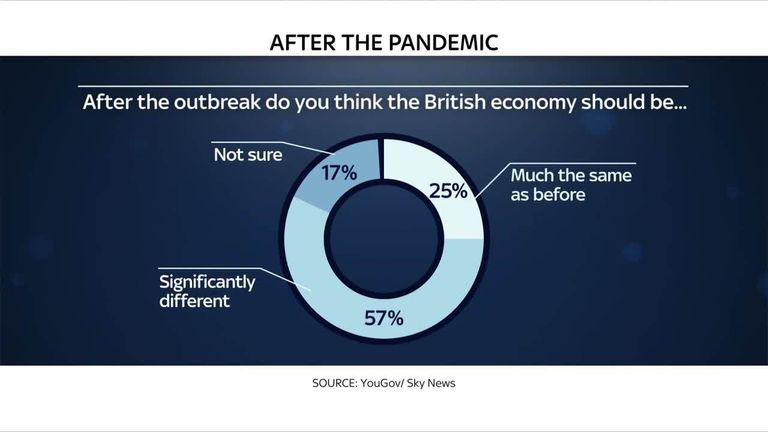After The Pandemic: Why coronavirus 'new normal' could help us repair economic inequalities in society
Stephanie Kelton says if we don't use COVID-19 to address inequality, we risk the economic fallout happening over and over again.
Wednesday 3 June 2020 07:41, UK
Stephanie Kelton is an American economist and a former adviser to Bernie Sanders during his 2016 US presidential election campaign.
She is a professor of public policy and economics at Stony Brook University in New York and a world leader on Modern Monetary Theory.
Here, she writes about how we can use the coronavirus pandemic to tackle the long-standing economic inequalities and social injustices that have plagued our society for decades.
I don't think we can go back to how it was before COVID-19. The fallout has already been too great. The pieces are already falling on the ground.
Experts are saying that as many as half of all small-to-medium businesses may not survive the coronavirus pandemic, 40 million people in the US have already lost their jobs and more than 30 million have lost their employer-sponsored health insurance.
In my case, at first we were postponing business conferences, but now we're just cancelling them, going right into 2021.
That has implications for air travel, hotels, restaurants and retail. We are going to see whole industries permanently shrink.
Employers are now realising it's possible for their employees to work from home and that we don't need many of the expensive leases on buildings in downtown Manhattan or London. That's going to have an effect on commercial real estate as well.
So what we have now is an opportunity, and we have two options of what we can do with it: one is to pick up the pieces and try to put them together as they were before.
This would mean trying to rebuild the economy as it was, with millions commuting long distances to work precarious, low-wage jobs, often without decent healthcare or paid sick leave.
But the other option is to assemble the pieces in a different and smarter way.
We don't have to go back to what we had, because if we do, most scientists are saying this virus is likely to come back again, so the job losses and the food bank queues will happen again. There will be another crisis and another crisis after that.
It took us just over six years after the last recession to claw back all the jobs that we lost. But we didn't restore good jobs. The jobs that came back were overwhelmingly lower-quality jobs - with lower pay and fewer hours.
I don't want to put the pieces back together that way. I want restore good jobs going forward. I want to build a more resilient economy, one without the stark inequities that have left so many people struggling to get by.
Let's use our "new normal" to repair those long-standing inequalities and injustices.
If we do it right, then we won't have an economy where so many people are working two or three jobs just so they can cobble enough money together to survive.
We could lift wages at the bottom and guarantee jobs for those who can't find employment in any other part of the economy. We can create jobs, wages would go up and people would have the option of public healthcare and childcare.
But if we do it wrong, there will be even more jobs lost, people will miss out on higher education and access to public services.
The job market in this situation is like a game of musical chairs, where the chairs are the jobs, and everyone in the game needs to find a chair.
The maths is such that if one person manages to find a new job and sit on a chair, that takes that job away from someone else and eventually that will keep happening until all the jobs are gone. Everyone left standing is unemployed.
We're not going to fix the problem of unemployment with low interest rates and retraining, because you can't train people to take jobs that don't exist, and you can't force anyone to borrow and spend when their economic outlook is grim.
:: Listen to the Daily podcast on , , ,
So we are going to have to think more boldly.
The only way to solve the employment problem is to augment the availability of jobs. If we don't, an awful lot of people are going to be permanently locked out of employment.
This is where governments can play a direct and active role.
In the UK, the government can fully fund the NHS and help create new jobs. They are not going to run out of pounds, they can fund whatever public services as generously as they want to fund them.
But if they choose not to, there will gratuitous suffering. And I use gratuitous because we have the capacity to address the problem - and not doing so would be a deliberate policy choice.
People are seeing a role for governments that they never saw before. Now everybody can see that the government can act, it can muster up firepower very quickly when there is a perception of a crisis.
So the new normal could be awful. It could be a decade of double-digit unemployment, poverty and social unrest. I don't want to close my eyes and picture that world.
Or it could be a beautiful world, where we come together to safeguard communities, battle climate change and redress long-standing inequities in our economy.
This week from today to Thursday, Dermot Murnaghan will be hosting After the Pandemic: Our New World - a series of special live programmes about what our world will be like once the pandemic is over.
We'll be joined by some of the biggest names from the worlds of culture, politics, economics, science and technology. And you can take part too.
If you'd like to be in our virtual audience - from your own home - and put questions to the experts, email afterthepandemic@AG百家乐在线官网.uk









